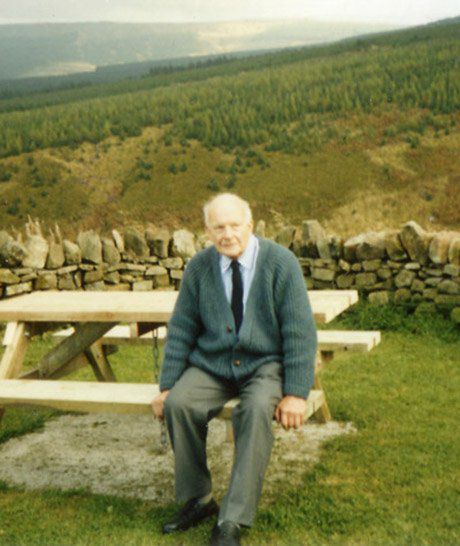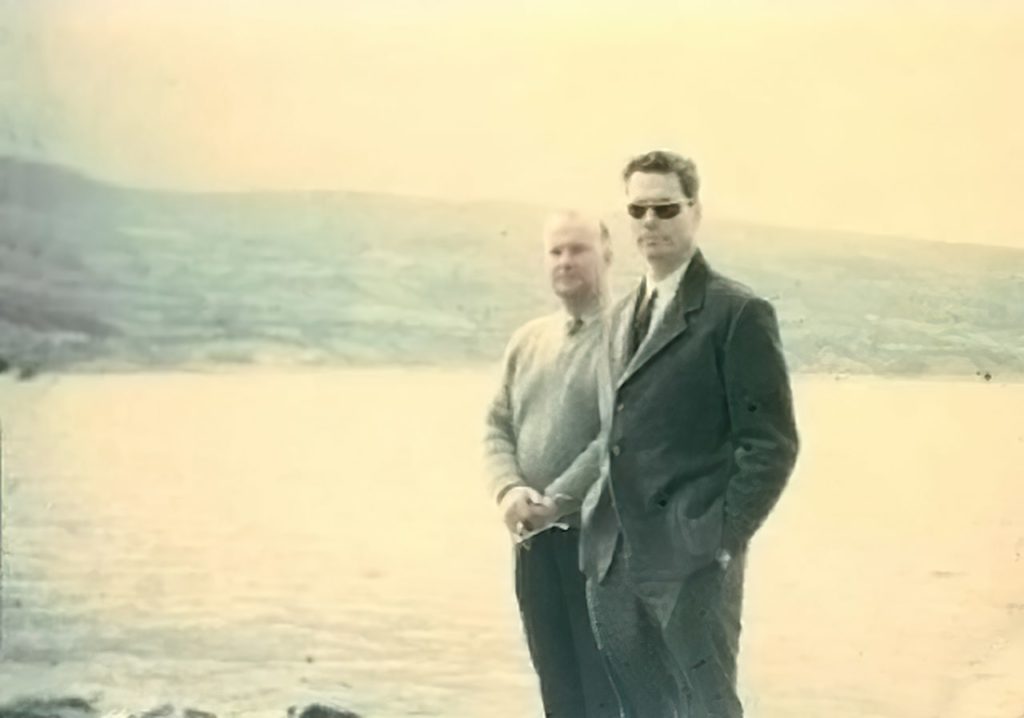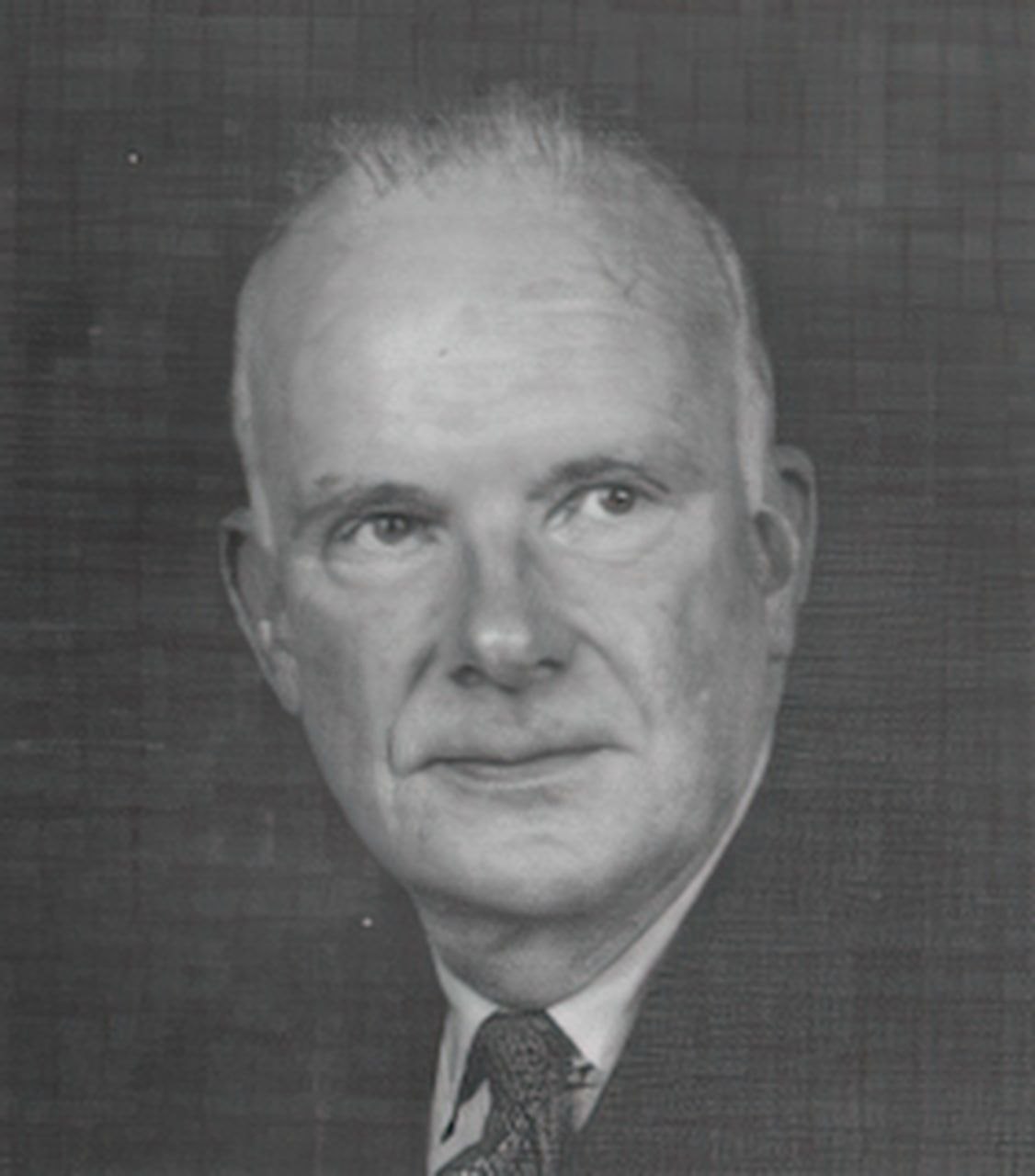Slightly corrected December 23rd 2022.
The following is an interview with Colin Jordan conducted by Tony Williams for his Column 88 magazine. This interview featured in issue no. 4, August 1998. Pp 23-26. This interview also appeared in Gothic Ripples, no. 38, March 1998. I first put this interview online in 2003 at the request of Colin Jordan himself on a now defunct website, and today once again make it available for all. It hadn’t been online before 2003 and until today hasn’t been available since 2004.
Few, very few, people have campaigned for, fought for, and persisted in, their beliefs for as long as Colin Jordan. Bloodied in combat, worn thin by repeated attacks by the system thought police, yet still somehow gathering energy to counterattack at every chance, one might have expected the noble wolf in him to have been whipped down to something more akin to a snarling, starving, hyena of hate. But such is not the case. Colin Jordan is too intelligent, too civilised, too much of a gentleman at heart to ever give way to the natural instincts which he has spent a lifetime summoning from the dark corners of his own race soul, expounding upon, and awakening in the hearts of his racial kinsmen.
When he spoke, thirty five years ago, of a life long struggle – he meant it. His sincerity, his commitment, his devotion to National-Socialism, his determined fighting spirit, is a model which shall inspire comrades in our struggle for generations to come. Probably only his friend Commander George Lincoln Rockwell has ever matched him for diehard daring and carelessness when it came to personal endangerment for the cause. ‘I know my mind, I speak my mind and I speak it out loud’ could be Jordan’s slogan in life. This makes him a natural leader, where his colleague John Tyndall had to consciously self-cultivate the way of the leader. Jordan has been an unexpectedly sharp witted thorn that has slashed complacent Jewish bullies – pushing their way through the otherwise timid crowd – more times than any Brit since Arnold Leese.
The NSM leader was honoured to be given this interview with comrade Jordan whose wits are as astute at the age of 75 as it was when the above photo was taken. Heil Jordan! Heil Victory!
TW: Colin, what is your opinion of the current state of the world-wide movement?
CJ: Lamentably underdeveloped, and as yet thoroughly inadequate to meet and defeat the challenge of the 21st Century.
TW: Apart from Adolf Hitler. who do you most admire historically, who as a National-Socialist and who in contemporary terms?
CJ: Historically, Edward 1st. As a National-Socialist: Dr Goebbels. As a contemporary: Leon Degrelle.
TW: Today’s NSM is, of course, unrelated to your own movement of that name in the 1960’s, which included John Tyndall. However, with John Tyndall appearing to be considering retiring as BNP leader will we see the end of an era? Do you expect any changes, such as the BNP growing more radical or overtly National-Socialist, or closer to the kind of conservative nationalism seen as benefiting the appeal of parties such as the Front Nationale of France? As a National-Socialist, what would be your advice to any new BNP leadership?
CJ: If and when Tyndall retires, the likelihood, indeed the near certainty, is that the BNP will continue and increase its course of compromise. This will signify not the end of an era, but a pronounced progression in one. Thus most certainly I do not expect the BNP to become openly or radically National-Socialist. No more do I see it fossilising in conservative nationalism. Instead I expect it will develop a populist or modified form of nationalism, towards which it has already shown many signs of proceeding, comparable to Blair’s modification of the Labour Party, replete with vote-catching gimmicks. It will thus take its place in the line-up of emasculated parties of democratic dissidence, along with those of LePen, Fini and Haider.
My advice to any new BNP leadership, advice which is certain to be rejected, would be to quit compromise in the futile pursuit of electoral victory and instead put quality above quantity in the pursuit of a seizure of power.
TW: Is Britain a more difficult place for National-Socialists than in the days of the original NSM?
CJ: Yes, because the situation has got much worse, the enemy much stronger, and their measures more aggressive and repressive. Time is fast running out. The point of no return is not far off.
TW: Your friends know you as someone more considerate, polite and sensitive than might be expected by some who associate our creed with the ‘virtue’ of ‘arrogance’. Is there any arrogance in being a National-Socialist and how far should we take account of the polite conventions of common courtesy in a society constantly admonished to despise people like us?
CJ: In the eyes of the enemy our fervour of conviction is arrogance. This essential fervour is not to be denied or decried, but it does not have to be bombast and contrived rudeness which is not an essential sign of strength. Frank avowal without inhibition and compromise must be the overriding aim, and, in so far as this allows politeness, by all means let this be included.
TW: If you had to admit to one weakness or failing, what would that be?
CJ: Apart from that failing of old age which is forgetfulness, I suppose that my constant aversion to enfeebling compromise can cause me at times to be immediately and excessively, impatiently and irritably intolerant of its advocates and practitioners, unwilling to listen to them. This I recognise can be a failing just as much as succumbing to any substantial extent to their message where it amounts in cause and effect to the voice of feebleness.
TW: Gothic Ripples is particularly insightful on the issues associated with Jewish influence over Aryans. However, Zionists would argue the reverse when it comes to more and more Jews ‘marrying out’ or marrying gentiles. Are you pleased that young Jews are losing their blood loyalty and so threatening the long term survival of Jewry, as Zionists would see it, or will National-Socialists be forced to recognise that we and the Zionists are equally concerned at this miscegenation?
CJ: For me a Jew, whether he marries outside or inside his tribe, carries racial qualities inimical to Aryan interests. Thus for me the menace remains, whether it is dispersed more widely in dilution by mixture in the offspring of intermarriage, or maintained in lesser dispersion but greater intensity by avoidance of mixture.
TW: I was born in Smethwick, a now very multiracial constituency, but a seat Mosley took in 1926 and the ‘Conservative leper’, Peter Griffiths, took on an anti-immigration platform in 1964, after intervention by the NSM. Was there a certain turning point ideologically, legally, or in the socio-political climate, which determined you against contesting elections?
CJ: I favoured contesting elections and contested them myself up to and during the period of my leadership of British Movement, which ended in 1975. Subsequently, and especially since l98O, I came to see, in the circumstances which had by then developed, the futility of electioneering. Those circumstances were the advanced effects of the conditioning of the public mind sought and achieved by the media, and the increasing repression brought about by politicians allied to that media.
TW: You will be 76 next June and suffered a stroke last year. How is your current state of health?
CJ: I reached 75 this June, and I had a bout of heart failure, not a stroke, in December of 1996. I seem to have well recovered from that,and, despite other defects of age, including a rather crippling and fatiguing osteoarthritis of one hip, I am fairly well in my days of decline.
TW: It takes a lot of guts to shout at Harold Wilson when he was PM from the Common’s public gallery, or march on to the platform of a Red meeting and grab the microphone, as you have done. Were you raised to stand up for yourbeliefs, or did such courage need cultivating from a sense of duty or a belief in will?
CJ: I suppose the answer is that when you are brimming over with furious indignation at what the renegades have done and are doing to the Britain I knew as a boy, you derive an extra impetus which carries you forward to do things you might well otherwise fight shy of.
TW: My father was born in Birmingham and, also like yourself, served in flight training in the RAF at the end of the War. The people of Birmingham seem very I strong minded and forthright, as do the people of Yorkshire. How significant is the idea of military service and regional character to National-Socialism, and were your parents sympathetic to your beliefs?
CJ: My parents were never frontally opposed to my beliefs, indeed they were basically in sympathy. When on trial at Exeter in 1967, my mother telephoned me to tell me “Remember, I am with you all the way!” I think that national service – both in the sense of military service and labour service – is essentially involved in National-Socialism. The folk conception, which is at the centre of National-Socialism, surely implies recognition of and provision for regional characteristics.
TW: Political works aside, who is your favourite author?
CJ: Thomas Hardy.
TW: You very rarely invite visitors and your home is very isolated Are you self-sufficient and no longer enjoy the company of others, or do you have a quite active social life outside politics?
CJ: Time, which you have cause specially to value and to husband as you grow old and slow down, is the prime reason why I decline visitors, apart from a very few who are special cases; not any unsociability or self-sufficiency. I would add in this connection that so many eminently pleasant people just want to, and love to, gossip, and want to visit for this purpose, whereas life is too short for unproductive wastage of words.
TW: You have written that “history is a saga of social decay and renewal”. Do you see this as ‘natural’ and thus inevitable, or will a revival of National-Socialism finally prove an exception to this cyclical rule?
CJ: National-Socialism has the inherent capacity to prove at least for a very long time an exception to the usual round of decay and revival; in fact this is precisely the proof of its excellence.
TW: Eugenic methods, to improve the genetic quality of the folk, is something you have endorsed. With modern gene replacement science it is already theoretically possible to detect and remove DNA strands derived from a non-white parent or ancestor from the foetus, producing white offspring (or black) ‘on demand’. Does such an idea horrify you, or should such parental control over their children’s racial character/genetic inheritance be encouraged?
CJ: I have no objection to, and instead give full approval to any eugenical measures which result in better physical and mental progeny, and are thus conducive to the upliftment of the pre-eminent makers of civilisation; the Aryans.
TW: This is a more personal question perhaps, but do you regret never marrying and what is your view on marriage as an institution?
CJ: I cannot regret never marrying because I did marry in 1963, divorcing in 1967. Without engaging in the unpalatable practice of apportioning blame, I would say that, with the wisdom of hindsight, I would have been wiser to have avoided that marriage. As to marriage as an institution, I am all for lasting, long-term liaisons, resulting from good choice, and being racially desirable and procreative, but without the unnecessary and harmful appendage of Christian contract.
TW: You were a friend of Arnold Leese, the pre-war leader of the Imperial Fascist League and author of the original Gothic Ripples. What was Leese, the man, like to know?
CJ: Arnold Leese was for me the archetypal John Bull, both in the frank integrity of his character and in his appearance. He researched and reported Jews in the same methodical spirit, he said, as he had investigated and reported the diseases of the camel when in earlier life he had been an Army veterinary officer. Bluff and brief in manner, he always spoke his mind without fear or favour.
TW: Have you found fulfilment and peace in later life, or has the struggle left you feeling emotionally drained and perhaps discontented and alienated from the dire state of today’s social fabric?
CJ: Our struggle is for me the meaning and purpose of life, and, whatever the failures and disappointments along the way, I have found adequate satisfaction in fighting what is to me the good fight.
TW: Looking back over 50 years of activity in NS politics, what would you say was your finest hour politically and/or personally?
CJ: July 1, 1962, when I told the thousands in Trafalgar Square at our NSM rally that “Hitler was Right!”, and the Jews there erupted in a hysterical riot on hearing this truth.
TW: Your final words to the readers of Column 88:
CJ: Never give in, however hopeless things seem, for in the very act of struggling on, regardless of the outcome otherwise, you are achieving a victory of the spirit which alone truly makes life worth living, and the achievement of which ennobles you in an assertion of your being.
TW: Comrade Jordan, my sincere thanks, Heil Hitler!
Above video interview source here.



